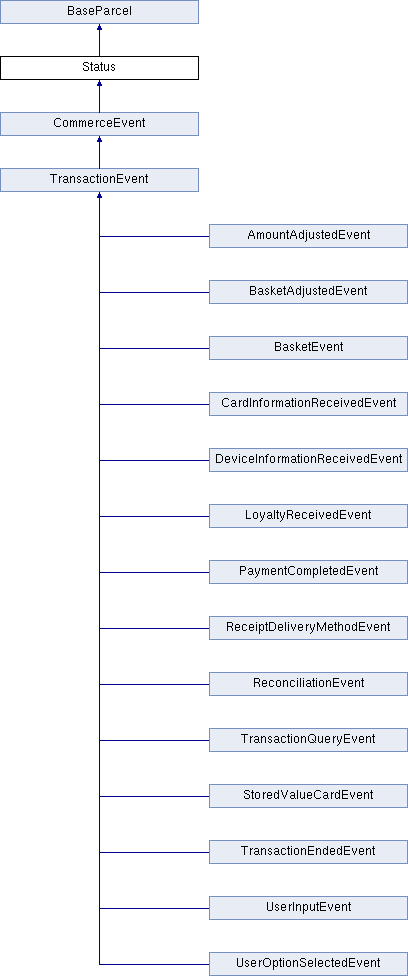


Public Member Functions | |
| String | getSessionId () |
| int | getStatus () |
| String | getType () |
| String | getMessage () |
| Status (Parcel in, int parcelVersion) | |
| void | writeToParcel (Parcel dest, int flags) |
| int | describeContents () |
 Public Member Functions inherited from BaseParcel Public Member Functions inherited from BaseParcel | |
| BaseParcel (Parcel in, int parcelVersion) | |
| void | setParcelVersion (int targetParcelVersion) |
| final int | getParcelVersion () |
| String | getClassName () |
| void | writeToParcel (Parcel dest, int flags) |
| int | describeContents () |
Static Public Attributes | |
| static final String | STATUS_SUCCESS = "SUCCESS" |
| static final String | STATUS_ERROR = "ERROR" |
| static final Parcelable.Creator< Status > | CREATOR |
 Static Public Attributes inherited from BaseParcel Static Public Attributes inherited from BaseParcel | |
| static final Parcelable.Creator< BaseParcel > | CREATOR |
Protected Member Functions | |
| Status (String sessionId, int status, String type, String message) | |
Additional Inherited Members | |
 Static Protected Member Functions inherited from BaseParcel Static Protected Member Functions inherited from BaseParcel | |
| static void | safelySetParcelVersion (final int targetParcelVersion, @Nullable BaseParcel item) |
| static void | safelySetParcelVersion (final int targetParcelVersion, @Nullable List<? extends BaseParcel > items) |
| static< T extends BaseParcel > void | safelySetParcelVersion (final int targetParcelVersion, @Nullable T[] items) |
The foundational Status class. This provides the structure for the return values of many of the API calls.
Definition at line 22 of file Status.java.
|
protected |
For internal use to generate the initial event.
Definition at line 79 of file Status.java.
| Status | ( | Parcel | in, |
| int | parcelVersion | ||
| ) |
Reconstruct the object from a parcel.
Definition at line 87 of file Status.java.
| String getMessage | ( | ) |
A user-readable message. This message may not be localized, in which case the type field should be used for determining a localized message.
Definition at line 72 of file Status.java.
| String getSessionId | ( | ) |
Get the session ID for the session which triggered this event.
Definition at line 47 of file Status.java.
| int getStatus | ( | ) |
Get the status for this particular event. A status of 0 means success, any other status is a failure.
Definition at line 55 of file Status.java.
| String getType | ( | ) |
The type of status. This will generally be SUCCESS for a status of 0, and contain a different type for other errors. For example, in a refund or void, it is possible to receive type TRANSACTION_NOT_FOUND. This may be used for localizing the specific messages as needed
Definition at line 65 of file Status.java.
|
static |
Definition at line 114 of file Status.java.
|
static |
The constant status type for a general error.
Definition at line 26 of file Status.java.
|
static |
The constant status type for success.
Definition at line 24 of file Status.java.
This document is the confidential property of Verifone, Inc. Any reproduction or distribution of this document, in whole or in part, or the disclosure of any of the information contained herein, without the prior written consent of Verifone, Inc. is prohibited. This document and any supplemental material supplied as part of any review must be returned to Verifone, Inc. upon request. Notice: This document may go through material revisions over time. While the Company will make every effort to keep readers updated as changes occur, care must be taken by the reader to make sure they are reading the latest version. Version numbers appear in the title page and revision history page of this document. All rights reserved. Verifone, the Verifone logo are either trademarks or registered trademarks of Verifone in the United States and/or other countries. All other trademarks or brand names are properties of their respective holders.